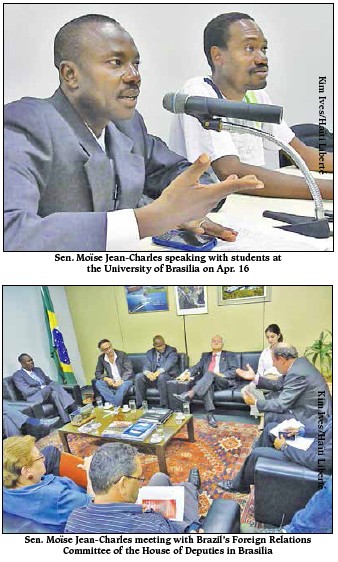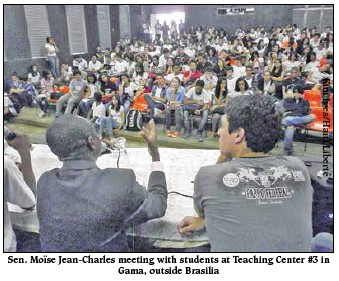|
Par
Kim Ives
 Senator
Moïse Jean-Charles is presently on a speaking tour in Brazil and
Argentina to raise consciousness about and to campaign against
the continued military occupation of Haiti by troops of the
so-called United Nations Mission to Stabilize Haiti or MINUSTAH.
June 1st will mark the 9th anniversary of
MINUSTAH’s deployment in Haiti, a flagrant violation of the UN
Charter and of the Haitian Constitution. A major demonstration
calling for MINUSTAH’s immediate withdrawal will be held in
Haiti on that date, with participants coming from across Latin
America. Senator
Moïse Jean-Charles is presently on a speaking tour in Brazil and
Argentina to raise consciousness about and to campaign against
the continued military occupation of Haiti by troops of the
so-called United Nations Mission to Stabilize Haiti or MINUSTAH.
June 1st will mark the 9th anniversary of
MINUSTAH’s deployment in Haiti, a flagrant violation of the UN
Charter and of the Haitian Constitution. A major demonstration
calling for MINUSTAH’s immediate withdrawal will be held in
Haiti on that date, with participants coming from across Latin
America.
Brazilian generals have led
MINUSTAH since its inception following the Feb. 29, 2004 coup
d’état against President Jean-Bertrand Aristide, and Brazilian
soldiers make up the largest contingent, about 2,200 of the
9,000-head force.
Senator Moïse
traveled to Sao Paolo, Brazil on Apr. 14 at the invitation of
the dissident Trabalho current of the ruling Brazilian Workers Party (PT).
On Apr. 15, he flew to the city of Juiz de Fora, where he met
with the mayor, local legislators, the teachers’ union, the
transport workers’ union, the city’s Movement of Blacks, and the
general public.
Moïse’s visit
to Juiz de Fora was favorably covered by an
extensive news report on
Globo, Brazil’s largest TV network. “I am opposed to the UN and
Brazilian military occupation of Haiti because I am a Haitian
nationalist,” he told the network.
Late in the day
of Apr. 15, the senator traveled to Rio de Janeiro, from which
he flew to Brasilia, Brazil’s capital. On the morning of Apr.
16, he met with over 200 high-school students who jammed into an
auditorium at Teaching Center #3 in the town of Gama, a suburb
of Brazil.
Translated into
Portuguese by Vogly Pognon, the only Haitian college student
studying at the University of Brasilia, Senator Moïse spoke to
the students, who displayed rapt attention for over two hours.
“95% of the Haitian population is against the occupation,” Moïse
told the students. “When the Haitian people hear about UN
soldiers raping young Haitians, they are angered. They heard
about another young Haitian who was found hung on the UN base in
Cap Haïtien. But if a neighborhood has some insecurity and they
call MINUSTAH, the soldiers say it’s not their concern and never
show up. But when the Haitian people rise up due to hunger, the
MINUSTAH shows up to beat them with clubs and to tear-gas them.”
Later that
afternoon, Senator Moïse met with the Foreign Relations
Committee of the House of Deputies in Brasilia. Four deputies,
Committee president Nelson Pellegrino and Fernando Ferro, both
of the PT, and Luiza Erundina and José Stédile, both of the
Brazilian Socialist Party (PSB), held a cordial meeting of over
90 minutes with the senator, who stressed, as he did at other
meetings, that the Haitian Senate had unanimously voted a
resolution in 2011 calling on MINUSTAH to withdraw from Haiti by
October 2012. That resolution has been flagrantly ignored.
Then later on
the evening of Apr. 16, Senator Moïse met for almost two hours
with students at the University of Brasilia, who asked him many
questions. “Everybody knows that Brazil is heading up the UN
military occupation in Haiti,” he said in response to one
question. “But who is making the big money in Haiti? The
Americans. Who is giving the orders? The Americans. This game of
bluff has to stop.”
On Apr. 17,
Senator Moïse will meet with the Brazilian Senate’s Human Rights
Commission in Brasilia, and later in the day hold another public
meeting.
On Apr. 18, he
will travel to Sao Paolo, where he will meet with several
legislators in the local parliament, as well as hold public
meetings.
On Apr. 21,
Senator Moïse will travel to Argentina where he will meet with
senators and deputies there, as well as hold a large public
meeting with the Workers’ Central of Argentina (CTA), one of
Argentina’s largest unions. The union will also present the
senator with an award for his work in Haiti.
“I commend the government and the people of Brazil
on the great progress they have made in this country in recent
years,” Senator Moïse said to the students at the University of
Brasilia. “But in my country, things are only going to get more
complicated for them if the Brazilian troops stay. Recently,
President Michel Martelly, who was put in power by Washington,
was asked in France if he was afraid of the people rising up
against him. He answered that he was not, because the MINUSTAH
was there to protect him. That remark says it all.”
|